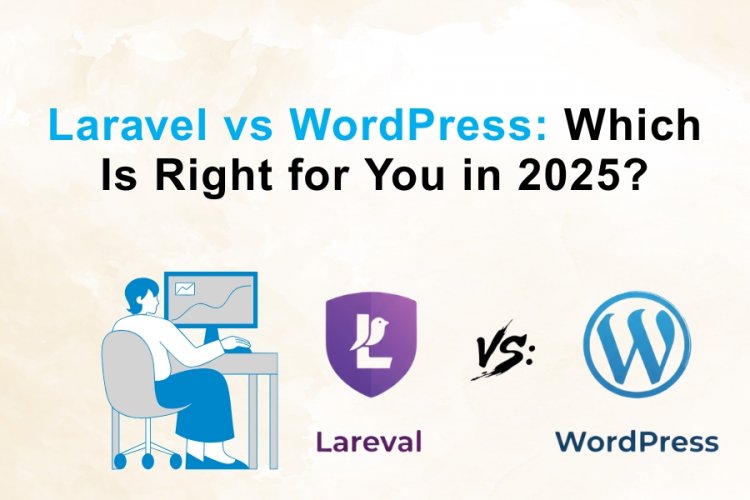Laravel vs WordPress: Which Is Right for You in 2025?

Choosing the right platform for your website development project can make all the difference in how your business grows online. With so many frameworks and content management systems available today, two names often dominate the conversation — Laravel and WordPress. Both are powerful, popular, and capable of building stunning websites, but they serve very different purposes. So, if you’re planning to launch a new website in 2025 and can’t decide between Laravel and WordPress, this detailed comparison will help you make the right choice based on your goals, budget, and technical expertise.
Introduction to Laravel and WordPress
Before diving into their differences, let’s understand what Laravel and WordPress actually are:
WordPress is a content management system (CMS) that powers over 40% of websites worldwide. It’s perfect for blogs, business sites, eCommerce stores, and portfolios. WordPress makes website development simple, even for non-developers, with its vast collection of themes and plugins.
Laravel, on the other hand, is a PHP-based web framework designed for Laravel developers who want to build custom, high-performance web applications. It provides complete control over the backend, making it ideal for complex, scalable websites and apps.
Laravel vs WordPress – Key Differences
Let’s break down the comparison between Laravel vs WordPress based on the most important aspects of website development in 2025.
Ease of Use
WordPress:
WordPress is incredibly user-friendly. Anyone can create a website using its drag-and-drop builders and pre-designed themes. It doesn’t require coding skills, making it a favorite among small businesses and content creators.
Laravel:
Laravel is for experienced developers who want complete flexibility. It doesn’t come with a dashboard like WordPress. Instead, everything is built from scratch, giving you total control over design, logic, and functionality.
Verdict: For beginners, WordPress wins. For developers seeking control, Laravel is ideal.
Customization and Flexibility
WordPress:
With over 50,000 plugins and thousands of themes, WordPress lets you customize almost everything. However, it has limitations if you need advanced functionalities or unique workflows.
Laravel:
Laravel offers unmatched flexibility. Developers can build custom features tailored to your business model — whether it’s an eCommerce system, CRM, or data-driven platform.
Verdict: Laravel offers deeper customization, while WordPress provides quicker solutions.
Performance and Speed
WordPress:
Because WordPress relies on plugins and themes, performance can vary. With proper optimization and caching tools, WordPress website can perform well, but heavy plugins may slow things down.
Laravel:
Laravel is built for speed. It uses modern PHP architecture and supports tools like caching, queue management, and optimized routing — making it ideal for performance-intensive applications.
Verdict: Laravel delivers superior performance for high-traffic or complex websites.
Security
WordPress:
Being the world’s most popular CMS makes WordPress a frequent target for hackers. Security largely depends on how regularly you update plugins and themes. Using reliable hosting and professional maintenance services can reduce risks.
Laravel:
Laravel offers built-in security features like CSRF protection, password hashing, and input validation. Developers can implement robust security protocols to safeguard data and user information.
Verdict: Laravel offers better security control for sensitive or enterprise-level projects.
Scalability
WordPress:
WordPress can handle moderate traffic efficiently, but scaling a WordPress websites for enterprise-level performance may require advanced optimization, CDN usage, and plugin management.
Laravel:
Laravel excels in scalability. It allows developers to handle large databases, multiple APIs, and high traffic volumes with ease — perfect for startups expecting rapid growth.
Verdict: Laravel wins for long-term scalability and complex web applications.
SEO and Content Management
WordPress:
SEO is one of WordPress’s strongest points. Plugins like Yoast SEO and Rank Math simplify on-page optimization, meta tags, and readability. The CMS also makes content publishing and editing effortless.
Laravel:
Laravel doesn’t have built-in SEO tools or a content management system. Developers need to code SEO functionalities manually or integrate third-party tools.
Verdict: WordPress is the best choice for SEO-friendly and content-rich websites.
Development Cost and Maintenance
WordPress:
WordPress is cost-effective. You can build a professional website using free themes and plugins, with additional customization at minimal cost. Maintenance is simple, especially with managed hosting services.
Laravel:
Laravel development requires experienced developers, so the initial cost is higher. However, the result is a custom-built, high-performance solution that’s easier to scale and maintain in the long run.
Verdict: WordPress is budget-friendly, while Laravel is an investment in performance and longevity.
When to Choose WordPress
Choose WordPress if you:
-
Want a simple website design or blog without coding knowledge
-
Need quick website deployment
-
Focus on SEO and content marketing
-
Have a limited budget
-
Run a small business or portfolio website
With professional website development company, you can customize WordPress themes, improve speed, and optimize performance effortlessly.
When to Choose Laravel
Choose Laravel if you:
-
Need a custom, scalable web application
-
Expect high traffic and data-driven functionality
-
Prioritize security and performance
-
Have a team of developers or access to eCommerce website development
-
Want complete control over your project’s architecture
Laravel is perfect for businesses that outgrow the limitations of CMS platforms and want a future-ready digital presence in 2025.
Laravel vs WordPress – Quick Comparison Table
| Feature | WordPress | Laravel |
|---|---|---|
| Ease of Use | Beginner-friendly | Developer-focused |
| Customization | Plugin-based | Fully customizable |
| Performance | Good (depends on plugins) | Excellent |
| Security | Moderate | High |
| SEO | Built-in tools | Requires coding |
| Scalability | Limited | Excellent |
| Cost | Low | Medium to High |
| Ideal For | Blogs, business sites | Web apps, enterprise sites |
Final Thoughts
Both Laravel and WordPress are excellent platforms, but your choice depends on your business goals. If you need a fast, content-driven website, WordPress is the way to go. However, if your vision involves complex functionality, scalability, and security, Laravel is the smarter investment. With the right Novel Web Solution team, either platform can help you build a powerful online presence in 2025 — one that’s fast, secure, and future-ready.






